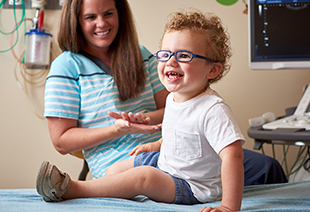Advancing Care for Brachial Plexus Birth Injury with Pioneering Research

Innovative clinical and laboratory research at Cincinnati Children’s on brachial plexus birth injury (BPBI) is driving the field forward with multiple research studies. For example, two separate studies on the clinical side – one on children and one on adults – are focusing on the lifestyle impact of BPBI. In the laboratory, scientists are continuing to advance their breakthrough findings made last year on a targeted drug that has prevented neuromuscular contractures in mice with BPBI.

Clinical Research Focuses on Quality of Life with BPBI
A three-year, multicenter North American study conceived by Cincinnati Children’s is investigating the questions: What is the overall impact of BPBI on a child’s health-related quality of life, and what factors drive that impact in childhood and beyond?
“The psychosocial aspects of this injury are every bit as powerful as the physical aspects,” says Roger Cornwall, MD, Cincinnati Children’s pediatric hand surgeon. “There’s a need to view this injury holistically, and we need more data to do that.”
Funded by a registry grant from the Pediatric Orthopaedic Society of North America (POSNA), the study is enrolling children with BPBI and using a framework from the World Health Organization (WHO) International Classification of Functioning (ICF) for measuring health and disability to determine the impact of this condition on the many facets of a child’s physical, social and psychological well-being.
Researchers will build a data registry and have already partnered with three more children’s hospitals to register their patients.
Both this study with children and a second multi-year study with adults who live with brachial plexus birth injury are being conducted under the umbrella of Plexus Nexus, an international consortium of BP experts co-founded by Cincinnati Children’s.
For the adult study, Plexus Nexus is partnering with the country’s largest BP injury family/patient support group, the United Brachial Plexus Network, using qualitative and quantitative surveys and interviews to identify and quantify the holistic impact of the condition in adulthood.
Groundbreaking Biological Research
In the laboratory, Cornwall and his research team discovered during a study of mice last year a targeted drug to prevent neuromuscular contractures resulting from BPBI. Since then, they have engaged in translational research to bring this work one step closer to treating humans.
Their most recent study recognized the need to continue treatment as long as muscles are growing. Cornwall also is looking at alternatives to the proteasome inhibitor bortezomib used to prevent contractures in the mouse model. He hopes to identify drugs that more specifically target muscles and nerves, with less potential for toxicity.
For information or referrals, call 513-636-PLEX (7539).

